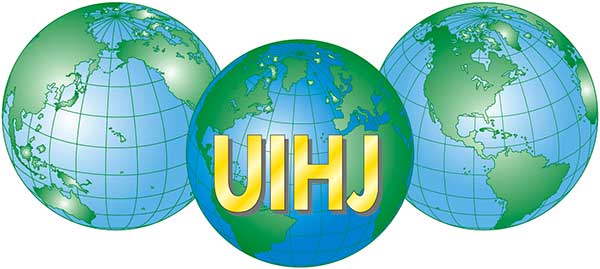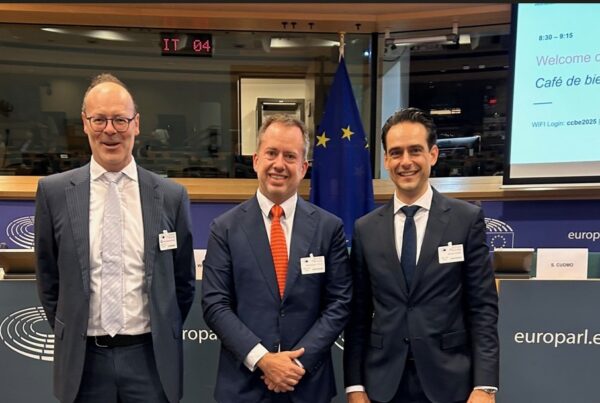On 16 May 2025, the Spring Council of the International Union of Judicial Officers (UIHJ) was held in The Hague, bringing together representatives from 33 countries.
On 15 May 2025, as a prelude to the Spring Council of the UIHJ, the meeting of the organisation’s Scientific Council was held in The Hague. Members discussed strategic issues such as the impact of EU Directive 2018/958 on the regulation of professions, the progress of the working groups on artificial intelligence (shared responsibility and the search for information), as well as the draft Global Code of Enforcement. The meeting also offered a first opportunity for brainstorming on the theme of the next UIHJ International Congress, scheduled for 2027.
In the afternoon, a conference on innovations in the profession of judicial officer, organised by the KBvG, brought together many participants. The event opened with an address by Mr T. Struycken, State Secretary for Legal Protection of the Netherlands, who presented his ministry’s strategy regarding e-Justice. Several Dutch and European experts then shared concrete initiatives related to digitalisation in enforcement, debt management, and improved access to justice. A concluding roundtable offered a European perspective on these major transformations.
These preparatory events set the stage for the following day.
On 16 May 2025, the Spring Council of the International Union of Judicial Officers (UIHJ) was held in The Hague, bringing together representatives from 33 countries. A symbol of the profession’s vitality and unity on a global scale, the event was marked by in-depth discussions on the organisation’s current priorities: governance, innovation, training, digitalisation, and international cooperation.
From the outset, President Marc Schmitz recalled the importance of the UIHJ in promoting professional standards and the rule of law. Secretary General Patrick Gielen presented an impressive activity report: more than 125 events organised in six months, averaging more than one per working day.
The UIHJ also strengthened its ties with international institutions such as the European Commission, CEPEJ, ELI, EIPA, the World Bank, UNIDROIT, ERA, and the Hague Conference on Private International Law.
The meeting also highlighted the UIHJ’s efforts in training and cooperation projects. Several initiatives were praised, such as podcasts on enforcement, the e-FILIT project co-financed by the European Commission, the ERA project, and the PACE project on privacy protection.
The “job shadowing” programme, the first concrete project from the Think Tank on Training, allowed professionals to discover practical procedures in France and Greece. At the same time, the enforcement guide for Laos is nearing completion.
The “Training Think Tank”, led by Françoise Andrieux, has held four meetings since its creation. Its mission is to develop training programmes tailored to the members’ needs, structure training paths for office staff, strengthen partnerships with universities, and propose new modules (e.g., in real estate law, guardianship, or compliance). A specific training school is also planned.
On the normative and technological front, the Spring Council approved the future publication of the Global Code of Enforcement and the addition of a new section on Artificial Intelligence. A highlight of the day was the presentation by Jos Uitdehaag, 1st Vice-President, on the ELI’s work regarding the enforcement of digital assets. The adopted principles confirm that these assets may be subject to enforcement like traditional goods, while requiring appropriate protection mechanisms and the creation of dedicated electronic wallets for enforcement agents. The UIHJ thus positions itself at the forefront of modernising enforcement procedures.
Another major advancement concerns the digitalisation of acts via the e-EDES – JUDEX portal. This system, interconnected with e-CODEX, enables secure and standardised transmission of judicial and extrajudicial documents within the framework of European Regulation 1784/2020.
The Spring Council also reinforced its institutional ties. Melissa Ford, First Secretary of the Hague Conference, presented the 2019 Convention on the Recognition and Enforcement of Judgments, which recently entered into force in 33 countries, with upcoming application in the United Kingdom, Albania, and Montenegro. The UIHJ plays an active role in promoting this convention, particularly in the Balkans.
Finally, special attention was given to UIHJ’s communication strategy. The newsletter was relaunched, two new sections were added to the website, and social media has become a major tool to showcase activities. The Latin American Forum and efforts to engage with new members were also commended.
This Spring Council, organized jointly with the KBvG of the Netherlands, demonstrated that the UIHJ is more than ever a driver of reform, innovation, and cooperation in the service of a modern, human, and efficient justice. The next meeting is scheduled for November 2025 to continue this ambitious dynamic together.





















